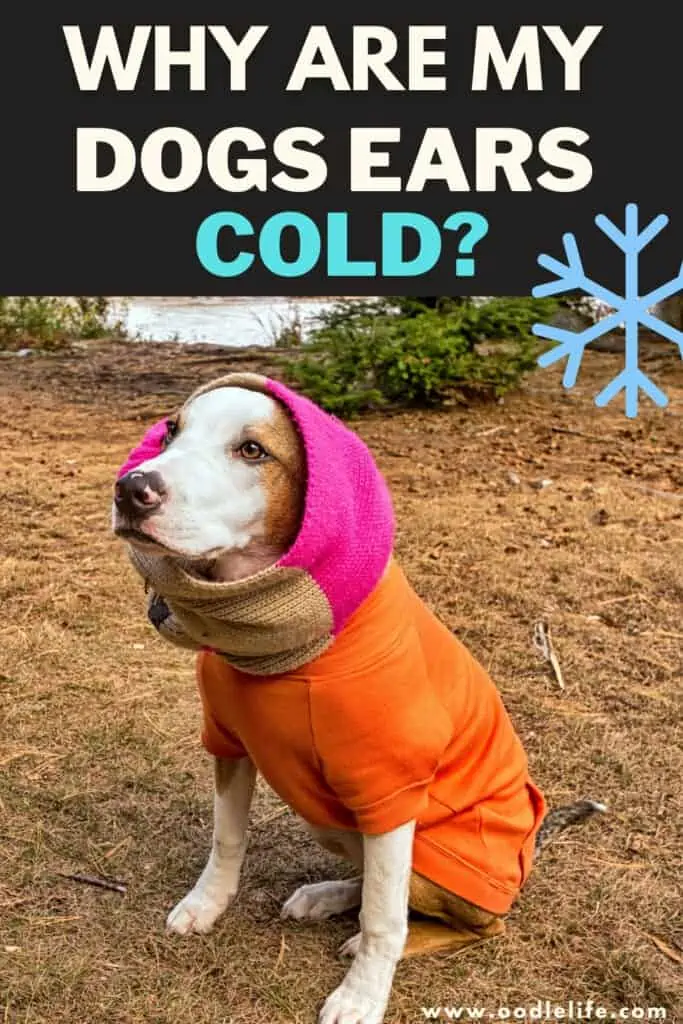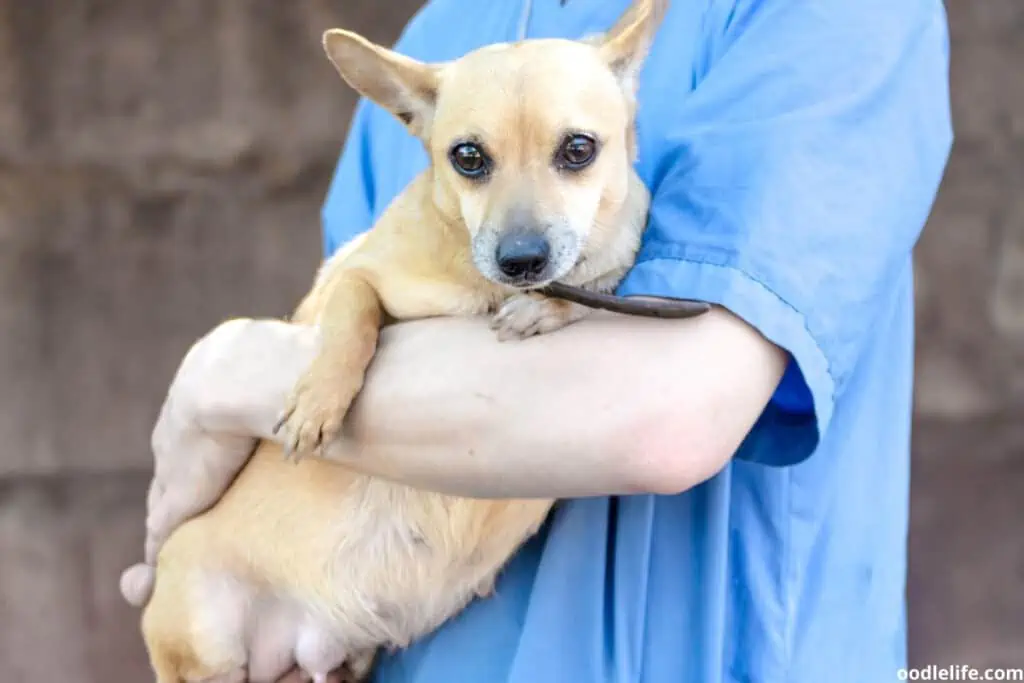Why Are My Dog’s Ears Cold? (5 Reasons)
Have you ever pet your dog and noticed that its ears feel cold to the touch? Although it isn’t something that necessarily means your dog is in trouble, it can be unsettling. So, why are your dog’s ears cold?

There are three primary reasons why your dog’s ears feel cold. It could be due to cold weather, especially if your dog has short hair. Another reason their ears could be cold is that they’re sick. A fever or other immune system response can make some parts of a dog’s body cooler.
More severe is a circulatory issue. If your dog has poor circulation, not enough blood could be traveling to extremities, like their ears.
Let’s go through the different reasons why dogs get cold ears and how to relieve them.
Cold Weather’

If you live in an environment that regularly dips below 32ºF, your dog’s cold ears may be the result of the weather. Although this may seem obvious, some people think their dog’s fur protects them from the cold.
Your dog’s fur can only protect them from the cold so much. Dog’s ears are thin and, like humans, are mostly made out of cartilage. Since cartilage doesn’t have any blood vessels, your dog’s ears can’t regulate temperature very well.
That means your dog’s ears can get cold extremely fast. If your dog has short fur, the problem can present itself faster. Short fur isn’t a good insulator because it doesn’t retain heat as well as longer fur, so their ears get cold quicker.
Your dog’s body also prioritizes their organs over their extremities when they’re exposed to the cold. This is a way to ensure their vital organs, like their lungs and heart, get enough blood to continue working. It can cause a reduction in blood flow, and therefore warmth, to their ears, though.
So, if it’s cold outdoors or if there’s a nasty wind chill, take precautions to ensure that your dog’s ears get warm. You can take shorter walks or purchase ear muffs for your pup.
Treating Cold Ears Caused by Cold Weather

If your dog’s cold ears were caused by cold weather, it’s an easy fix. Bring them inside your house and send them to the warmest room in your home. Then, it’s just a waiting game. Within about ten minutes, you should notice your dog’s ears are at a more normal temperature.
If you think your dog’s ears are dangerously cold, you can use blankets and warm compresses to warm them up quicker. Wrap their body in a blanket or two and use a warm compress on their ears, replacing it every few minutes for a new, warm compress.
Illness

If your dog has an illness, it could be the cause of their cold ears. The most common illnesses dogs get are colds and other viruses. The common symptoms of these diseases include:
- Congested nose
- Sneezing
- Dry heaving
- Coughing
- Fever
- Runny eyes
If your dog is displaying any of these symptoms and its ears are cold, it’s most likely sick. Dogs display various symptoms when they’re sick, and one of those symptoms is cold ears.
Cold ears aren’t a common symptom of an illness. In more cases, you’ll pet your dog and notice that its ears or head are hot. That indicates that your dog is sick with a fever. In most cases where you feel cold ears on your sick dog, they don’t have a fever.
Although most illnesses are mild and will resolve themselves in a short period, you should isolate your dog from other pets in your neighborhood. It’s very rare for a dog to pass a virus onto a human, but they can pass it on to other dogs.
Treating Cold Ears Caused by Illness
For most colds and other viruses, you can’t do much for your dog other than treat the symptoms. Treating cold ears caused by a cold or virus is the same as when they get exposed to the cold. Wrap them in a blanket and use warm compresses on their ears until they feel normal.
If your dog’s symptoms continue for more than ten days, you need to contact a veterinarian. Most cold symptoms subside in less than ten days. If they last longer, their illness could be more serious than a simple cold.
Poor Circulation

Poor circulation is a condition that is more common in older dogs and dogs with other conditions, like heart disease or cancer. Poor circulation is the most serious condition that can cause your dog to have cold ears.
Heart disease can cause a decrease in blood pressure and, therefore, circulation. Cancer, especially tumors, can cause many different symptoms, one of which is changes in blood pressure. If you suspect your dog is suffering from poor circulation but don’t have a diagnosis, you need to visit a vet.
Your vet will check for any underlying conditions that cause your pup’s poor circulation. If they have an underlying condition, treating it should help alleviate their poor circulation.
Treating Cold Ears Caused by Poor Circulation
Unfortunately, there isn’t any set-in-stone way to treat poor circulation. If your dog has an underlying condition, your vet will recommend a treatment path that should help alleviate their circulation issues. In rare circumstances, your veterinarian will prescribe drugs to improve your dog’s blood pressure.
There are very few ways to warm your dog’s ears when they have poor circulation. They might warm up if your dog lays down. When your dog’s heart is higher than its head, more blood will flow there. More blood means more warmth.

Wrapping Up
If your dog’s ears are cold, you shouldn’t worry too much. The most common reason dog’s ears are cold is because it’s cold outside. The next common reason is an illness like a cold or virus that causes your dog’s cold ears.
In rare cases, poor circulation is the cause of your dog’s cold ears. If you think your dog has poor circulation, you need to visit your local veterinarian. They’ll run tests to determine the underlying cause of the poor circulation.
Overall, cold ears aren’t necessarily a cause for concern. Warm them up again, and most dogs will feel good enough to start playing with their best buddies again!